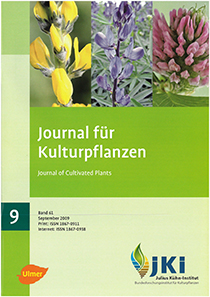Cultivation and Breeding of Legumes in Germany – Current Status and Perspectives, Expert Discussion at the Julius Kühn Institute, 21-22 April 2009, Braunschweig (Germany) – Report
DOI:
https://doi.org/10.5073/JfK.2009.09.11Keywords:
grain legumes, faba bean, pea, lupin, soybean, red clover, climate change, plant breeding, crop production, plant protection, value-added chainAbstract
The Expert Discussion was attended by more than 60 stakeholders from agricultural research, plant breeding, associations and the Federal Minstry of Food, Agriculture and Consumer Protection (BMELV). The discussion was based on a total of 11 survey lectures on various legumes, with a focus on grain legumes, with regard to plant breeding, crop production, agricultural economy and plant protection. Ten of these presentations are summarised by the authors in the present special issue of the Journal of Cultivated Plants. The Expert Discussion made clear that on the one hand, the growing of legumes brings about a number of agroecological as well as economical benefits some of which are relevant with regard to climate protection and adaptation to the ongoing climate change. On the other hand, the continuously decreasing acreages of grain legumes – faba bean, pea and lupin – demonstrate that meanwhile, sustainability of the growing and breeding of these crop species in Germany's agriculture is imperilled. The manifold reasons for this negative development and their interactions were intensively discussed at the expert meeting and are summarised as a SWOT analysis in the present report. Urgent need of action was identified with regard to breeding and crop research, to the authorisation of plant-protection products for their use in grain legumes, as well as to an integrated approach to communication and cooperation throughout the value-added chain.
Downloads
Published
Issue
Section
License
The content of the journal is licensed under the Creative Commons Attribution 4.0 License. Any user is free to share and adapt (remix, transform, build upon) the content as long as the original publication is attributed (authors, title, year, journal, issue, pages).
The copyright of the published work remains with the authors. The authors grant the Journal of Cultivated Plants, the Julius Kühn-Institut and the OpenAgrar repository the non-exclusive right to distribute and exploit the work.







